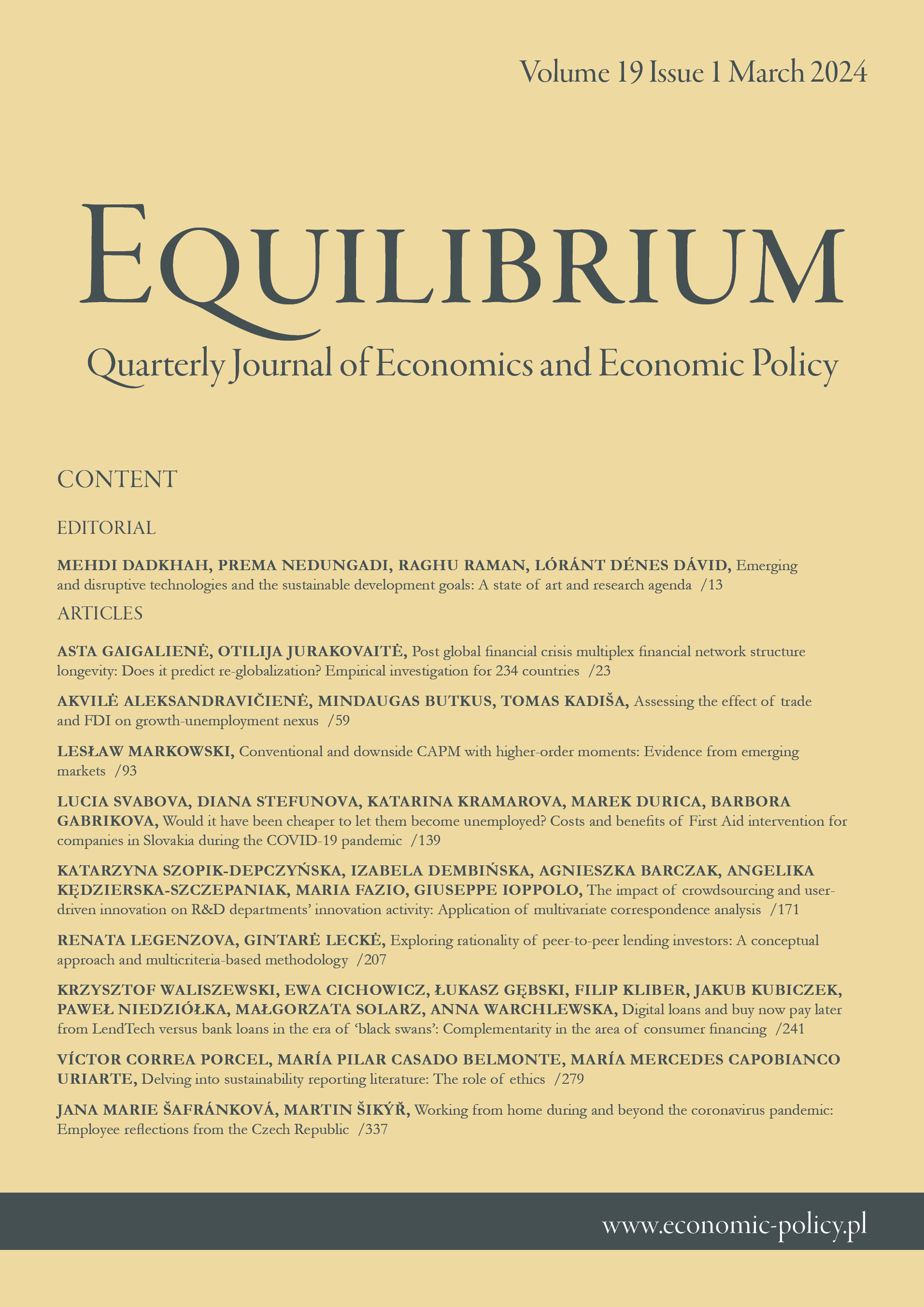创新障碍是否会影响企业在商业周期内创新活动的变化?波兰绿岛的影响
IF 5
Q1 ECONOMICS
Equilibrium-Quarterly Journal of Economics and Economic Policy
Pub Date : 2019-12-31
DOI:10.24136/eq.2019.030
引用次数: 20
摘要
研究背景:毫无疑问,创新是经济增长的重要来源。在对波兰工业加工企业创新活动的评价中,可以发现两种相反的观点。第一种是全球金融危机及其相关的创新危机和随后的创新悲观主义时期所带来的外生冲击。第二张图显示波兰经济是欧洲绿岛,因为在过去的27年里,波兰经济持续强劲增长,通货膨胀得到控制,失业率下降,公民福利增加。在这种情况下,出现了一个值得填补的有趣的研究缺口,其中心是决定企业创新活动的因素,特别是创新障碍在商业周期各个阶段的作用和重要性。本文的目的:研究的目的是确定在经济周期中创新壁垒对波兰工业加工企业创新活动的影响及其重要程度。分析的时间框架涵盖了经济周期的三个阶段:2004-2006年的繁荣期、2008-2010年的全球金融危机和2012-2014年的复苏。方法:采用Pearson’s ?2独立检验和对应分析进行资料分析。研究结果以双标图的图形形式呈现,描述了三种变量的共存:(1)企业类型和所有制部门;(2)创新活动的效果或目标;(3)创新障碍和缺乏创新的原因。计算的基础是涵盖上述期间的三个数据库。发现与附加值:波兰工业加工企业的创新活动对经济波动具有较高的抵抗力。在第一个分析时期,当经济繁荣蓬勃发展时,创新壁垒及其重要性对企业经营的影响很小。全球金融危机对创新活动的影响被证明是违反直觉的,因为企业不断实现其目标,创新障碍的重要性进一步降低。在第三个时期,创新壁垒对企业的创新活动不再有任何意义。创新壁垒的重要性逐渐下降的现象,无论在经济周期的哪个阶段,被称为波兰绿岛效应。所发现的这种关系是近代世界经济史上可能前所未有的一个特点。本文章由计算机程序翻译,如有差异,请以英文原文为准。
Do barriers to innovation impact changes in innovation activities of firms during business cycle? The effect of the Polish green island
Research background: There is no doubt that innovation is an important source of economic growth. In the assessment of the innovative activity of Polish industrial processing enterprises, two opposing views can be found. The first indicates the exogenous shock resulting from the global financial crisis and the associated innovation crisis and the subsequent period of innovative pessimism. The second shows the Polish economy as the European Green Island due to strong and uninterrupted economic growth over the past 27 years, controlled inflation, and reduction of unemployment as well as increase of the citizens’ well-being. In these conditions, an interesting research gap appeared, which is worth filling, at the centre of which there are factors determining the innovative activity of enterprises, and in particular the role and importance of innovation barriers in various phases of the business cycle. Purpose of the article: The aim of the research is to determine the impact of innovation barriers and degrees of their importance on the innovation activity of Polish industrial processing enterprises during the business cycle. The time frame of the analysis covers three phases of the cycle: the prosperity period of 2004–2006, the global financial crisis of 2008–2010 and the recovery from 2012–2014. Methods: Pearson’s ?2 independence test and correspondence analysis were used for data analysis. The research results are presented in a graphical form of biplots that describe the coexistence of three types of variables: (1) types of enterprises and ownership sectors, (2) effects or objectives of innovative activity, and (3) innovation barriers and reasons for the lack of innovation. The basis of calculations were three databases covering the mentioned periods. Findings & Value added: High resistance of innovative activity of Polish industrial processing enterprises to economic fluctuations has been demonstrated. Innovation barriers and degrees of their importance had little impact on the operations of enterprises in the first of the analysed periods, when prosperity was booming. The impact of the global financial crisis on innovation activities proved to be counterintuitive, as enterprises have continuously achieved their goals and the importance of innovation barriers has diminished even more. In the third period, innovation barriers no longer had any significance for the innovation activities of enterprises. The phenomenon of a gradual decline in the importance of innovation barriers, regardless of the phases of the business cycle, was called the Polish Green Island Effect. The relationship found is a peculiarity which is probably unprecedented in recent world economic history.
求助全文
通过发布文献求助,成功后即可免费获取论文全文。
去求助
来源期刊
CiteScore
9.20
自引率
3.50%
发文量
28
审稿时长
36 weeks
期刊介绍:
Equilibrium. Quarterly Journal of Economics and Economic Policy is a scientific journal dedicated to economics, which is the result of close cooperation between the Instytut Badań Gospodarczych/Institute of Economic Research (Poland) and Polish Economic Society and leading European universities. The journal constitutes a platform for exchange of views of the scientific community, as well as reflects the current status and trends of world science and economy.
The journal especially welcome empirical articles making use of quantitative methods in: Macroeconomics and Monetary Economics, International Economics, Financial Economics and Banking, Public Economics, Business Economics, Labor and Demographic Economics, Economic Development, and Technological Change, and Growth.
Current most preferable topics and special issues:
The economics of artificial intelligence: business potentials and risks;
Digitalization and entrepreneurship in economics;
Sustainable socio-economic development, environmental and ecological economics;
Transition in the energy market (improving energy efficiency, alternative energy sources, renewable energy, energy security).

 求助内容:
求助内容: 应助结果提醒方式:
应助结果提醒方式:


